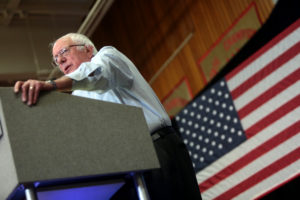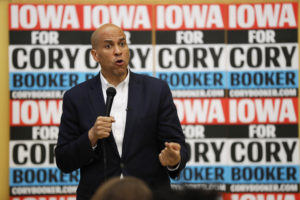‘Israel Lobby’ Splits Could Lead to Two-State Solution, Professor Says
Fissures within pro-Israel organizations could someday result in a peace between Israel and Palestine, according to international relations expert Stephen Walt. President Trump, speaking at the 2016 American Israel Public Affairs Committee policy conference. (Lorie Shaull / Wikimedia Commons)
President Trump, speaking at the 2016 American Israel Public Affairs Committee policy conference. (Lorie Shaull / Wikimedia Commons)
A new column by Stephen Walt, an American professor of international affairs at Harvard University’s John F. Kennedy School of Government, posits that pro-Israel forces could, someday, pressure the United States into supporting a two-state solution between Israel and Palestine.
Walt, who co-wrote a controversial article and book on the “Israel lobby” with John Mearsheimer a decade ago, explains how the “lobby”—which he describes as “a loose coalition of pro-Israel individuals and organizations like the American Israel Public Affairs Committee, the Anti-Defamation League, the Washington Institute for Near East Policy and Christians United for Israel, just to name a few”—is changing from within.
He reviews the “core argument” he and Mearsheimer came up with 10 years ago. “We argued that decades of unconditional U.S. support for Israel — the so-called ‘special relationship’ — is not explained by U.S. strategic interests or by shared values, as is often claimed, but is due primarily to the political efforts and activities of the lobby,” he writes. “The result, we also argued, does more harm than good to both the United States and Israel.”
Walt asserts that this argument “is still correct,” yet “shifts inside the pro-Israel community and in Israel itself may yet lead to positive shifts in U.S. Middle East policy and to a healthier relationship between the two countries.”
He explains:
Despite the lobby’s continuing influence, however, there is a more open discussion of Israel-related issues today than there was before we wrote our article and book. Together with long-term trends in the region and the United States, the ability to speak more openly about Israel is likely to diminish the lobby’s impact on U.S. foreign policy in the future. …
There is also a growing divide within the American Jewish community over what is best for Israel itself. Scholars like Dov Waxman, Steven Simon and Dana Allin have documented that American Jews today are less reluctant to criticize Israel’s policies or the actions of the Israeli government. The creation of the pro-peace lobby J Street, the rapid growth of progressive groups like Jewish Voice for Peace, and the success of controversial online journals critical of Zionism, such as Mondoweiss, show that attitudes about Israel are more complicated than in the past. Reflexive support for whatever Israel does is no longer the default condition for many American Jews. …
These trends stem from a core tension: The vast majority of American Jews remain deeply committed to liberal values, while Israel has been moving away from them for many years now. There is a certain tension between liberalism and Zionism, because liberalism assumes that all humans possess the same set of basic rights and it emphasizes mutual tolerance, while Zionism is a nationalist movement that in its current iteration privileges one people at the expense of another.
Walt concludes that, despite this clear “splintering” within the Israel lobby, political forces in the U.S. continue to ardently defend the lobby.
“Barring a major shift in Israel’s political trajectory, therefore, the fissures within the lobby — and in the American Jewish community more broadly — are likely to widen,” he concludes. “Political pressure from a powerful, pro-Israel and pro-peace lobby in the United States is probably the only development that would convince U.S. leaders to act as fair-minded mediators and persuade the Israeli government to grant the Palestinians a viable state of their own.”
Read the full article here.
–Posted by Emma Niles.
Your support matters…
Independent journalism is under threat and overshadowed by heavily funded mainstream media.
You can help level the playing field. Become a member.
Your tax-deductible contribution keeps us digging beneath the headlines to give you thought-provoking, investigative reporting and analysis that unearths what's really happening- without compromise.
Give today to support our courageous, independent journalists.






You need to be a supporter to comment.
There are currently no responses to this article.
Be the first to respond.